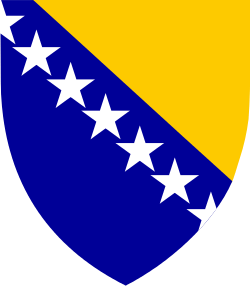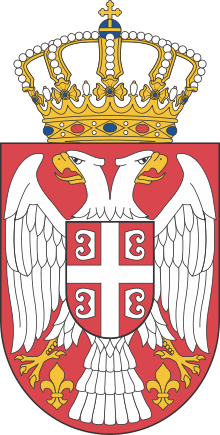Republika Srpska–Serbia relations
Republika Srpska |
Serbia |
|---|

Republika Srpska–Serbia relations are foreign relations between Republika Srpska, one of two entities in Bosnia and Herzegovina, and Serbia. Republika Srpska has office of representation in Belgrade[1] and Serbia has consulate-general in Banja Luka.[2] Serbia and Republika Srpska have signed Agreement on Special Parallel Relations.
The beginnings of formal cooperation can be traced to the Bosnian War; Republika Srpska got support from Serbia.[3] At the Dayton Agreement, the President of the Republic of Serbia Slobodan Milošević represented the Bosnian Serb interests due to absence of Radovan Karadžić. Dayton Agreement ensure the right for entities in Bosnia and Herzegovina to establish special parallel relationships with neighboring countries consistent with sovereignty and territorial integrity of Bosnia and Herzegovina. Agreement on Special Parallel Relations is signed in February 28, 1997. The Agreement was implemented December 15, 2010.[4] Until now was organized significant number of formal and informal meetings between representatives of two sides.
On July 26, 2010, the Serbian Minister of Finance Diana Dragutinović and her Republika Srpska counterpart Aleksandar Džombić signed an Agreement on Cooperation in the Financial Sector, which will further develop mutual relations in the financial system. It will bolster the already good cooperation between the two, and help to maintain special parallel relations and enable exchange of experience, also discussing other sections. The working groups will convene at least twice a year.[5]
Kosovo question
Republika Srpska supports position of Serbia in dispute over Kosovo. On 21 February 2008 Republika Srpska adopted resolution through which it denounced and refused to recognise the declaration of independence of Kosovo from Serbia. In addition, the parliament adopted resolution stating that in the event that majority of EU and UN states recognise Kosovo's independence, Republika Srpska would cite the Kosovo secession as a precedent and move to hold a referendum on its own constitutional status within Bosnia and Herzegovina. Finally, the resolution called upon all Republika Srpska officials to do everything in order to prevent Bosnia and Herzegovina from recognising Kosovo's declared independence.[6] Regardless of Declaration part that calls for referendum in Republika Srpska, Serbia's official position remained unchanged and continued to support the sovereignty and integrity of Bosnia and Herzegovina.[7][8][9]
On July 31, 2011, President Milorad Dodik said that the concept of a multi-ethnic state in Kosovo has failed, and that the solving of the Kosovo question has not been dealt with, stressing that Republika Srpska does not accept Kosovo as an independent country. Dodik said "The peaceful solution is evidently not a possible solution [...] We support Belgrade." in relation to the Kosovo police operation trying to take control of border crossings located in North Kosovo on July 25.[10]
Secession of Republika Srpska
See also
- Politics of Republika Srpska
- Foreign relations of Bosnia and Herzegovina
- Foreign relations of Serbia
- Dayton Agreement
- Bosnia and Herzegovina–Serbia relations
References
- ↑ "Представништва Представништва Републике Српске у иностранству". Retrieved 2 May 2016.
- ↑ http://www.mfa.gov.ba/HTML/Ambasade/AmbasadeUBiH/AmbuBiH_Srbija_KonzulatBLuka.html
- ↑ Judah. The Serbs. Yale University Press. pp. 222–224. ISBN 978-0-300-15826-7.
- ↑ http://emg.rs/en/news/serbia/141801.html
- ↑ "emportal.rs - This website is for sale! - emportal Resources and Information.". Retrieved 2 May 2016.
- ↑ "Priznanje Kosova i referendum u RS". B92.net. Retrieved 2 May 2016.
- ↑ "Tomislav Nikolić u državi koju priznaje i entitetu kojeg voli". DW.COM. Retrieved 2 May 2016.
- ↑ "Banka.hr - Josipović i Tadić za cjelovitu BiH". banka.hr. Retrieved 2 May 2016.
- ↑ cafe.ba. "Najnovije BiH vijesti, magazin, sport, muzika, film, oglasi - Najnovije vijesti @ Cafe.ba". Retrieved 2 May 2016.
- ↑ "Dodik: Kosovsko pitanje nije rešeno". B92.net. Retrieved 2 May 2016.

